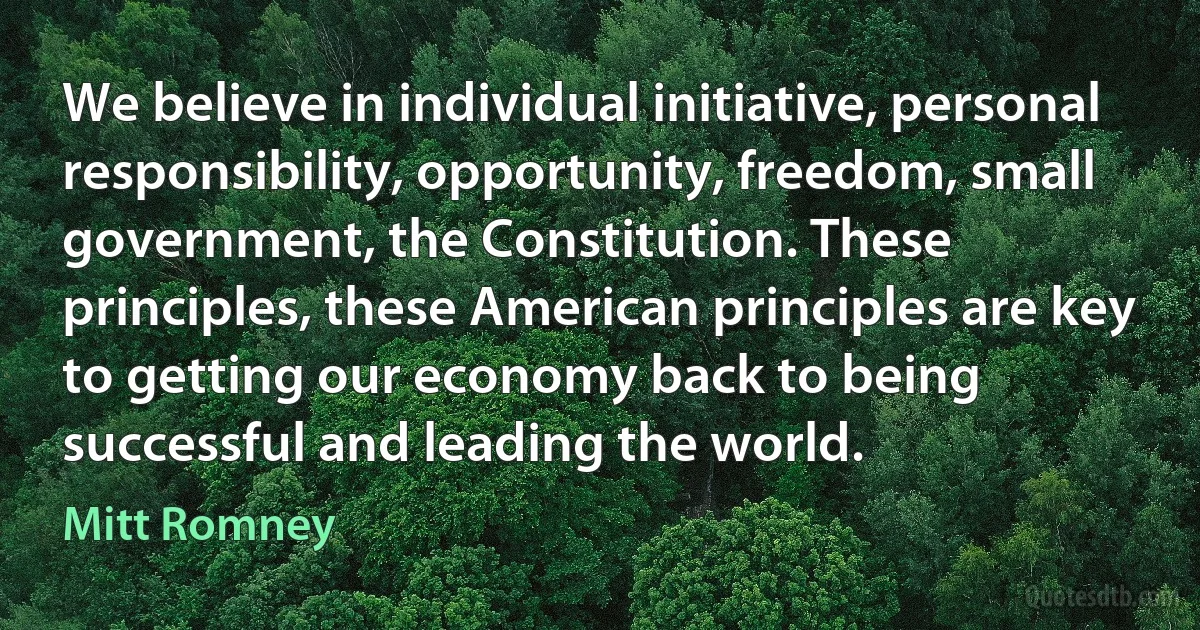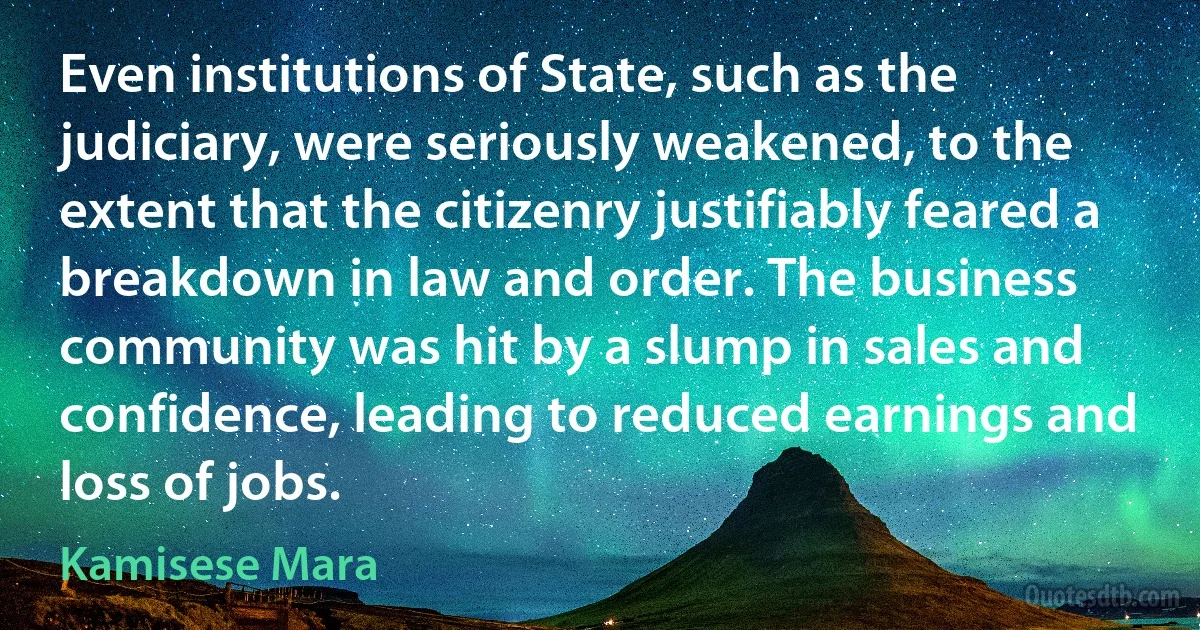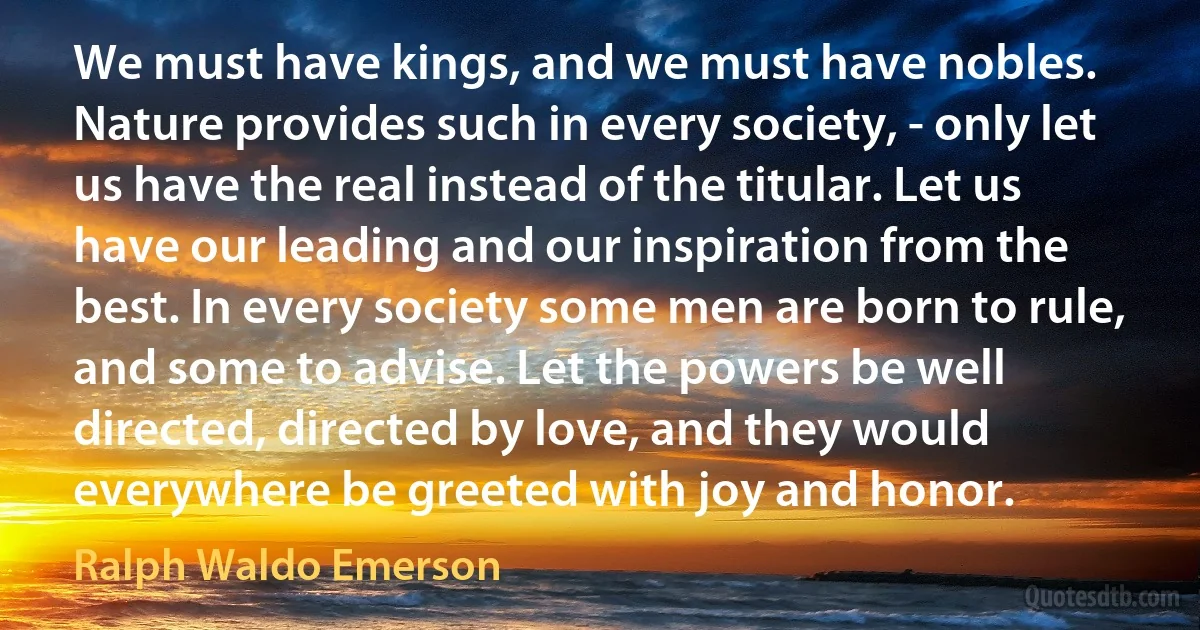Leading Quotes - page 17
Be kind, Helen, I am so tired of thinking;
There are so many difficult corridors of thought,
With equal iron banisters leading back again:
So many stone stairs, Helen, up which I sought
To rediscover the windy sky, and stand, blinking,
In the lost sunlight: as bright as pain,
Helen. I would give almost anything now
Even for pain.

T. H. White
It's hard to know how to deal with liberalization in cultures that have been repressed for a long time, that don't have strong civil societies. But for the United States, of all countries, to be talking about human rights just rings very, very hollow in light of all the objections to our policy in Israel - the perception that we're hard on one side and not on the other, and that we don't contest the settlements or human-rights abuses committed by Israeli soldiers, and so on. Plus the fact that we have turned our back on international treaties and not been a global citizen, I think, makes people, even democrats, the leading lights in these repressed societies, very squeamish about being associated with the United States.

Samantha Power
In fact, the Church never admitted free-will, or used the word when it could be avoided. In Latin, the term used was liberum arbitrium,- free choice,- and in French to this day it remains in strictness libre arbitre still. From Saint Augustine downwards the Church was never so unscientific as to admit of liberty beyond the faculty of choosing between paths, some leading through the Church and some not, but all leading to the next world.

Henry Adams
Gerrard has been my idol for 10 years and is one of the best players in the world. He is the example of what all midfield players aspire to. He is always there in the heat of the battle, leading by example. He is everywhere you look - in defence, in the middle of the pitch and in attack. I would love to be close to that level.

Steven Gerrard
As to the origin of life, any life, I thought, we remain ignorant. Our science theorizes about the beginning of the cosmos or the birth of life. Our religions postulate endless versions of a man-God, hardly more rational than we are, as the Creator. In the past I have sometimes thought that maybe life is meaningless after all. Then I'd think that maybe the Seth material is a kind of cosmic poppycock -- the chemical composition of my mind somehow intelligent enough to understand the irony of its own meaninglessness, then spinning desperate yarns, as many psychologists would say; futile fantasies leading nowhere. But then I'd think that a brain that could conceive or order somehow had to emerge from a greater order. Besides that, earlier I hadn't realized (I thought, feeling better) that science and religion had spun some pretty weird yarns themselves, and if poppycock was being measured on a scale of one to ten, in my book anyhow they'd each get a twelve and a gold star.

Robert Butts
When you (President Ratu Sir Penaia Ganilau) called me at Lomaloma in December 1987 and asked me to form an Interim Government to prepare the country for a return to parliamentary rule, I knew the task at hand would be onerous. Fiji had experienced the ordeal of two military coups. Society was fractured, the economy was tottering and the country had been ostracised by some of its oldest friends and allies. There was no Parliament and no properly functioning political system. Even institutions of State, such as the judiciary, were seriously weakened, to the extent that the citizenry justifiably feared a breakdown in law and order. The business community was hit by a slump in sales and confidence, leading to reduced earnings and loss of jobs.

Kamisese Mara
The church has not been in the habit of pursuing enemies with kind words and charitable deeds. To tell the truth, it has always been rather relentless. It has preached forgiveness, but it has never forgiven. There is in the history of Christendom no instance where the church has extended the hand of friendship to a man who denied the truth of its creed. There is in the church no spirit-no climate-of compromise. In the nature of things there can be none, because the church claims that it is absolutely right-that there is only one road leading to heaven. It demands unconditional surrender. It will not bear contradiction. It claims to have the absolute truth. For these reasons it cannot consistently compromise, any more than a mathematician could change the multiplication table to meet the view of some one who should deny that five times five are twenty-five.

Robert G. Ingersoll
It does harm a great many other people, but primarily because it's prohibited. There are an enormous number of innocent victims now. You've got the people whose purses are stolen, who are bashed over the head by people trying to get enough money for their next fix. You've got the people killed in the random drug war. You've got the corruption of the legal establishment. You've got the innocent victims who are taxpayers who have to pay for more and more prisons, and more and more prisoners, and more and more police. You've got the rest of us who don't get decent law enforcement because all the law enforcement officials are busy trying to do the impossible.
And, last, but not least, you've got the people of Colombia and Peru and so on. What business do we have destroying and leading to the killing of thousands of people in Colombia because we cannot enforce our own laws? If we could enforce our laws against drugs, there would be no market for these drugs.

Milton Friedman
Industrial progress, mechanical improvement, all of the great wonders of the modern era have meant little to the wealthy. The rich in ancient Greece would have benefited hardly at all from modern plumbing - running servants replaced running water. Television and radio - the patricians of Rome could enjoy the leading musicians and actors in their home, could have the leading artists as domestic retainers. Ready-to-wear clothing, supermarkets - all these and many other modern developments would have added little to their life. They would have welcomed the improvements in transportation and in medicine, but for the rest, the great achievements of western capitalism have rebounded primarily to the benefit of the ordinary person. These achievements have made available to the masses conveniences and amenities that were previously the exclusive prerogative of the rich and powerful.

Milton Friedman
If you are receptive and humble, mathematics will lead you by the hand. Again and again, when I have been at a loss how to proceed, I have just had to wait until I have felt the mathematics led me by the hand. It has led me along an unexpected path, a path where new vistas open up, a path leading to new territory, where one can set up a base of operations, from which one can survey the surroundings and plan future progress.

Paul Dirac
I call upon you, young men, to obey your heart, and be the nobility of this land. In every age of the world, there has been a leading nation, one of a more generous sentiment, whose eminent citizens were willing to stand for the interests of general justice and humanity, at the risk of being called, by the men of the moment, chimerical and fantastic. Which should be that nation but these States? Which should lead that movement, if not New England? Who should lead the leaders, but the Young American?

Ralph Waldo Emerson
The doubts that Mr. Balfour expressed nearly thirty years ago, in an Address delivered in Glasgow, have not, so far, been answered. And it is probable that many people, to whom six years ago the notion of a sudden decline or break-up of our western civilisation, as a result not of cosmic forces but of its own development, would have appeared almost fantastic, will feel much less confident to-day, notwithstanding the fact that the leading nations of the world have instituted a league of peoples for the prevention of war, the measure to which so many high priests of Progress have looked forward as meaning a long stride forward on the road to Utopia.

J. B. Bury



